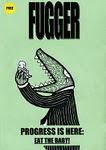(pictured: an earlier example)
This is it, the 500th post
on Fugger, the people's blog (as long as that person is me). Post 500
is the last post of 2014 and Fugger is rampaging into its sixth year
so what better time than now to look back on the classic posts of the
past ...and boy what a past. It may be only six years online but
let's not the forget the previous several million years during which
Fugger told it like it is and raised a few chuckles along the way.
The first ever Fugger blogpost, ever,
the first one EVER, was made by me when I was just a primordial
mollusc. It was all about the latest craze
that had hit the primordial mollusc world.
That craze was 'movement'. 'You can go and get food, it's great,'
blogged the mollusc me. 'No longer do you
have to be stuck on a rock next to the same gobshite for the rest of
your existence. With the power of movement you can start to sidle
away from him and within a month or so he'll be four or maybe even
four and half feet away,' evangelised the
blogging mollusc that was I. The comments
section beneath my inaugural mollusc post
were less than enthusiastic (I used to get comments back then). 'It'll
never catch on,' said another mollusc.
'Sorry, I hoped that I'd enjoy your blog but this is ridiculous,'
pointed out yet another mollusc, 'movement
requires too much energy and you have to eat to get that energy and
the very act of eating itself uses up all the energy we get from it.'
'Hmm,' thought the molluscy me, 'Im off to a rough start.'
The blog didn't really pick up until I
slithered out from the ocean and started to leave my posts in
patterns in wet sand that I made with my franticly wriggling eel like
body. Other organisms enjoyed my observations on how the sun came up
and went down and how the sea went in and went out and how it's all
really boring and we should expect more from existence. Then the
limbs came and I started scratching my blogposts on rocks that
eventually became cave homes that became rudimentary constructs that
then became pyramids. Yes, a lot of those hieroglyphics
are Fugger posts. Mainly taking the piss out of pharaohs and that.
Over time, Fugger has charted the
follies and triumphs of our species. The invention of the wheel, the
invention of the gun, space exploration and shite telly. I've said
quite a lot and sometimes I wonder when I'll have said enough but
then something comes along and I say something else. There is always
more to say and there will be more and more ways to say it and the
ways to indulge what is being said will evolve also for we are
reaching a new time. A time when things are destroyed and new things
are created. A significant time. A time that is already well
underway. Everything we know is changing and change is coming faster
than ever before and there is more and more and more of it. Soon,
before you know it, we will have as much in common with who we are
now as who we are now has in common with the primordial molluscs
we once were. We are being led somewhere to create something that is
currently beyond our comprehension. We were brought about to bring
something about and that something really will be quite something.
To find out what that 'something' will
be you will have to join me for the next blogpost, Fugger post 501.
The first post of 2015. The first post of the new age. I'm going to
let you know the destiny of humanity. I'm going to let you know why
we are here and what awaits us. Seriously. The time has come. The day
is upon us. Steel yourselves. We are emerging from the sea again.

























